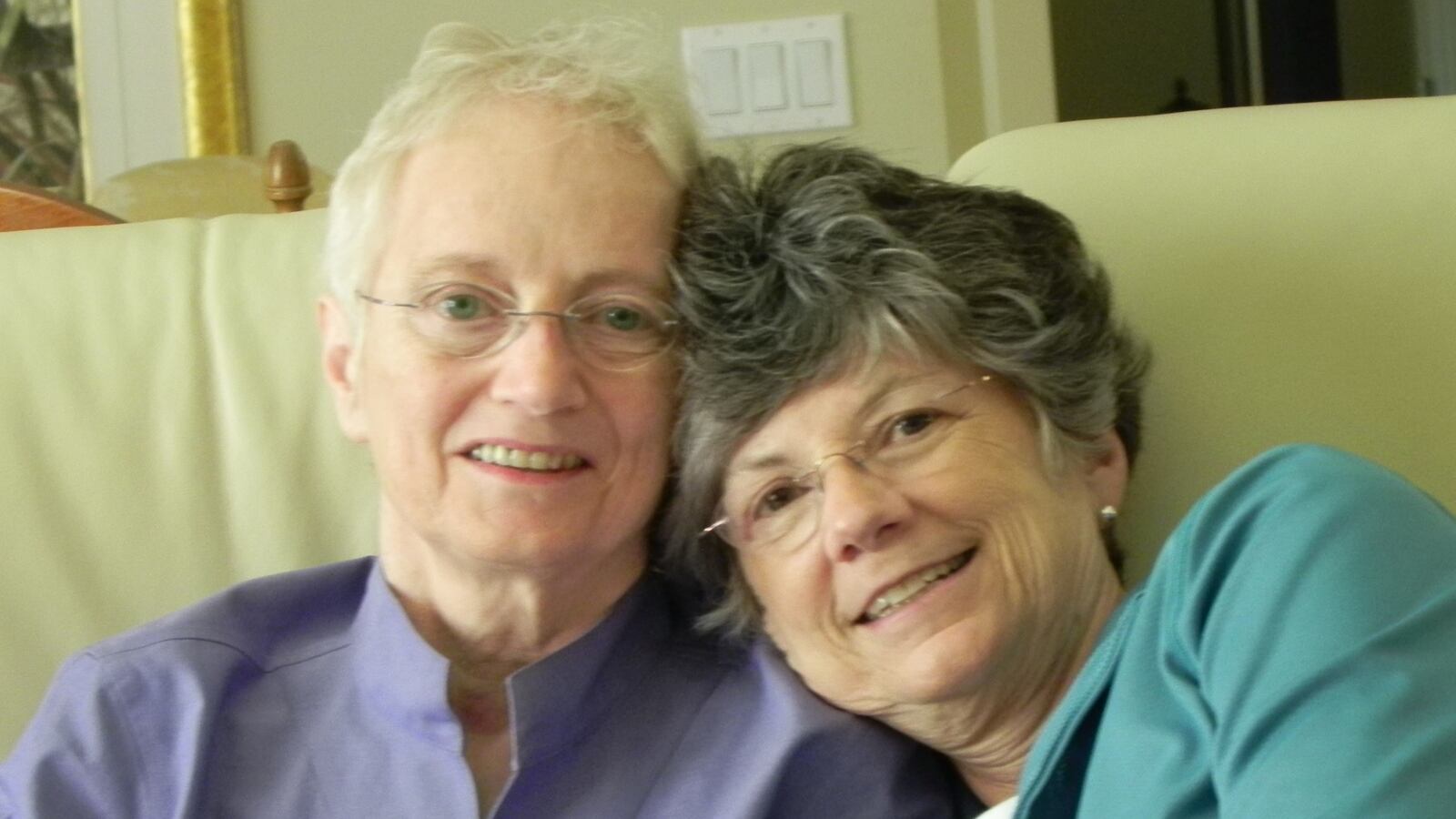Retired Lt. Col. Linda Campbell hopes the Supreme Court gives adequate notice of when it will hand down its rulings on same-sex marriage so she can snag a seat on a plane in time to be back in Washington for the historic decision. “I just have to be there. This means everything to me,” she says. “It’s the whole focus of my life. I don’t have Nancy anymore, I just have our marriage.”

After battling the U.S. military for almost a year, Campbell won a waiver for her deceased partner to be buried in a national cemetery, the first ever for a same-sex spouse, and she is looking to the Supreme Court to extend the right to others. She traveled to Washington, D.C. and stood in line in the cold to get just three minutes inside the court during last month’s oral arguments on marriage equality so she could lend her support—and demonstrate by her presence how much is at stake for people who for too long have had to settle for the watered-down version of marriage memorably dubbed “skim milk marriage” by Justice Ginsberg.
Edie Windsor is her champion, challenging the constitutionality of the Defense of Marriage Act (DOMA) and seeking equal treatment under the tax code after a 40-year partnership—just as Campbell fought hard to secure burial rights for Nancy. Together for 17 years, for 12 of those years, Nancy fought metastatic cancer. Knowing that her partner’s time was short, Campbell enlisted the help of Oregon Labor Commissioner Brad Avakian, who encouraged her to contact the Veterans Administration to seek a waiver, then wrote to the VA on her behalf and got Oregon Sen. Jeff Merkele to intervene. Nancy Lynchild passed away at age 64 on Dec. 22, 2012, and on Jan. 31, 2013, Campbell’s request was approved by Secretary Eric Shinseki. “I just fell on my knees,” she says.
Campbell was in line at 5 a.m. on the day the Supreme Court heard the oral arguments in Windsor’s case. She was wedged between a 12-year member of the Coast Guard and his partner, and a straight man with his 10-year-old daughter, Amy. It was cold, there were snow flakes, and the wind was bone-chilling. “We huddled together like penguins with Amy in the middle for five hours,” she recalled.
When they got into the courtroom for their allotted three minutes, they heard Justices Roberts, Kennedy, and Kagan each ask a question before they were ushered out. “I was thrilled, but I was so disoriented from being outside I could barely walk,” Campbell said. Back outside, she waited another two or three hours for Edie Windsor to appear. “I placed myself front and center and waited there, and when she came out, I just fell apart. The crowd was too big for her to notice me, but I was 3 or 4 feet away when I heard a fellow leading her say, ‘We’ve got to get her out of here; she’s going to get crushed.’ She’s a true hero of mine.”
At 83, Windsor is a role model for a generation of women like Campbell, who, at 66, has discovered it’s not too late to fight for her rights. Campbell says she sees herself and Nancy in the love story of Edie Windsor and her late partner, Thea Spyer. Braving the cold that March day in Washington, Campbell also found inspiration in little Amy, who waited in line uncomplaining all those hours. “Her teacher calls her the class politician. I had her sign my diary so I would have the signature of a famous woman when she grows up.”
Maybe love and perseverance go hand in hand. “Nancy really was a miracle,” Campbell said in a phone interview from her home in Portland. She explained that her partner had survived breast cancer and a double mastectomy before they were a couple. “When they told us she had metastatic disease, she was well schooled in what to expect, and she expected two years.”
She got 12 years, and in that time, the couple registered as domestic partners in Portland and made several attempts to get married. “I wanted the respect of marriage,” Campbell says, “and Nancy felt the same way. We wanted to be married, and we wanted the world to know—it’s an honor.” When San Francisco opened the door to same-sex marriage, they were ready to jump in the car and drive down, but they were told not to come, the line was too long. So they got a reservation, and by the time it was their turn, Prop 8 had passed and no more marriages of same-sex partners were being performed.
Nancy’s advancing illness forced the cancellation of a trip to the District of Columbia, where same-sex marriage was legalized in December 2009, and where they had arranged for a minister to marry them. They made it as far as the airport. Their next best option was Vancouver, British Columbia, a short plane ride from Portland, where they were officially married in 2010. “Nancy stayed in bed in the hotel room as I scurried around to get the paperwork and the minister and the flowers,” says Campbell. “She was up long enough to celebrate and have dinner.”
Lynchild will be laid to rest at Willamette National Cemetery near Portland, but Campbell has one more thing to take care of, and that’s the symbol on the headstone. Nancy wanted a bicycle, but then they’d settled on a bird. “We’re great birders,” Campbell said. The National Cemetery people said impossible, or next to impossible, and if you were to ask for it, it would take a very long time. How long? Four to six months. “That’s nothing,” Campbell said. “It took nine months to get approved for the cemetery.” An artist’s rendering of a Sandhill Crane is in the works, and Campbell is confident it will be approved.





